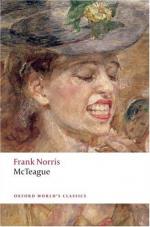|
This section contains 13,682 words (approx. 46 pages at 300 words per page) |

|
SOURCE: Caron, James E. “Grotesque Naturalism: The Significance of the Comic in McTeague.” Texas Studies in Literature and Language 31, no. 2 (summer 1989): 288-317.
In the following essay, Caron argues that McTeague is a comic story.
McTeague came and went furtively, dizzied and made uneasy by all this bustle. He got in the way; he trod upon and tore breadths of silk; he tried to help carry the packing boxes, and broke the hall gas fixture; he came in upon Trina and the dressmaker at an ill-timed moment, and retiring precipitately, overturned the piles of pictures stacked in the hall.1
Imagine this scene as part of a Buster Keaton film, and its slapstick quality immediately becomes obvious. Although the comic element in McTeague has been noted by Joseph McElrath, he refers to it as an “impure trait that mars the Naturalistic shape.”2 Admittedly, laughter is not the response which comes...
|
This section contains 13,682 words (approx. 46 pages at 300 words per page) |

|


